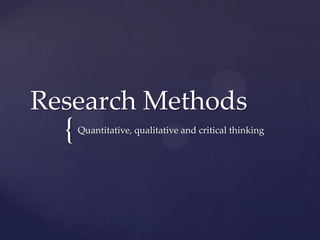
Sociologymethods 120903105424-phpapp02
- 1. Research Methods { Quantitative, qualitative and critical thinking
- 3. A hypothesis is an assumption made from your own knowledge or common sense. Hypothesis: a proposed explanation to a phenomenon
- 6. Correlation refers to a relationship between two (or more) variables in which they change together. A positive correlation means that as one variable increases(e.g., ice cream consumption) the other variable also increases (e.g., crime). A negative correlation is just the opposite; as one variable increases (e.g., socioeconomic status), the other variable decreases (e.g., infant mortality rates). What is correlation?
- 7. Yes…there is a correlation.
- 8. Causation refers to a relationship between two (or more) variables where one variable causes the other. In order for a variable to cause another, it must meet the following three criteria: 1. the variables must be correlated 2. one variable must precede the other variable in time 3. it must be shown that a different (third) variable is not causing the change in the two variables of interest (a.k.a., spurious correlation) What is causality?
- 9. Correlation is not causation.
- 10. Spurious Correlation Does it meet all three criteria?
- 11. 1. These variables are ones that are more or less controlled. 2. Scientists manipulate these variables as they see fit. 3. They still vary, but the variation is relatively known or taken into account. 4. Often there are many in a given study. Independent Variables
- 12. 1. Dependent variables are not controlled or manipulated in any way, but instead are simply measured or registered. 2. These vary in relation to the independent variables, and while results can be predicted, the data is always measured. 3. There can be any number of dependent variables, but usually there is one to isolate reason for variation. Dependent Variables
- 13. Independent Dependent (input) (output) 1. Intentionally manipulated 1. Intentionally left alone 2. Controlled 2. Measured 3. For example: known rate Vary at 3. Vary at unknown rate Cause 4. •If a scientist conducts an experiment to test the theory that a vitamin could 4. Effect extend a person’s life-expectancy, then the independent variable is the amount of vitamin that is given to the subjects within the experiment. This is controlled by the experimenting scientist. •The dependent variable, or the variable being affected by the independent variable in this case, is life span.
- 14. Variables: Type of School Liberals Arts v. University Type of Student Athlete? Gender? GPA? Time Bedtime, Waking, Arrival Mode of Transportation Example: What affects a student’s arrival to class?
- 20. “do no harm,” informed consent, voluntary participation, and protected populations. Ethics
- 21. Science, junk science, pseudo- science and non-science. http://www.youtube.com/watch?v=8T_jwq9ph8k
